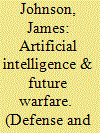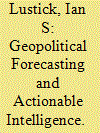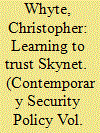| Srl | Item |
| 1 |
ID:
165361


|
|
|
|
|
| Summary/Abstract |
Recent developments in artificial intelligence (AI) suggest that this emerging technology will have a deterministic and potentially transformative influence on military power, strategic competition, and world politics more broadly. After the initial surge of broad speculation in the literature related to AI this article provides some much needed specificity to the debate. It argues that left unchecked the uncertainties and vulnerabilities created by the rapid proliferation and diffusion of AI could become a major potential source of instability and great power strategic rivalry. The article identifies several AI-related innovations and technological developments that will likely have genuine consequences for military applications from a tactical battlefield perspective to the strategic level.
|
|
|
|
|
|
|
|
|
|
|
|
|
|
|
|
| 2 |
ID:
183257


|
|
|
|
|
| Summary/Abstract |
In geopolitics, even rough probabilistic forecasts are difficult to make. Scenario design, table-top simulations and structured discussions are heuristic activities that focus the attention of analysts and increase policymaker satisfaction with intelligence products, but their usefulness is not based on confidence that forecasts are accurate. Traumatised by 9/11 and encouraged by advances in social science, computerised data collection and artificial intelligence, the US government has greatly increased investments in reliable geopolitical forecasting. Despite progress by using computerised data processing, sophisticated statistical methods and machine learning, the results have so far been of limited practical assistance. Forecasters must not only provide credible probability judgements but also show the causal pathways underlying them to enable policymakers to mitigate harms and exploit opportunities. Building that capacity means enhancing the role of social scientists in the design and testing of computer simulation and other forecasting techniques.
|
|
|
|
|
|
|
|
|
|
|
|
|
|
|
|
| 3 |
ID:
189937


|
|
|
|
|
| Summary/Abstract |
The use of AI to automate defense and intelligence tasks is increasing. And yet, little is known about how algorithmic analyses, data capture, and decisions will be perceived by elite decision-makers. This article presents the results of two experiments that explore manifestations of AI systems in the cyber conflict decision-making loop. Though findings suggest that technical expertise positively impacts respondents’ ability to gauge the potential utility and credibility of an input (indicating that training can, in fact, overcome bias), the perception of human agency in the loop even in the presence of AI inputs mitigates this effect and makes decision-makers more willing to operate on less information. This finding is worrying given the extensive challenges involved in effectively building human oversight and opportunity for intervention into any effective employment of AI for national security purposes. The article considers these obstacles and potential solutions in the context of data gathered.
|
|
|
|
|
|
|
|
|
|
|
|
|
|
|
|